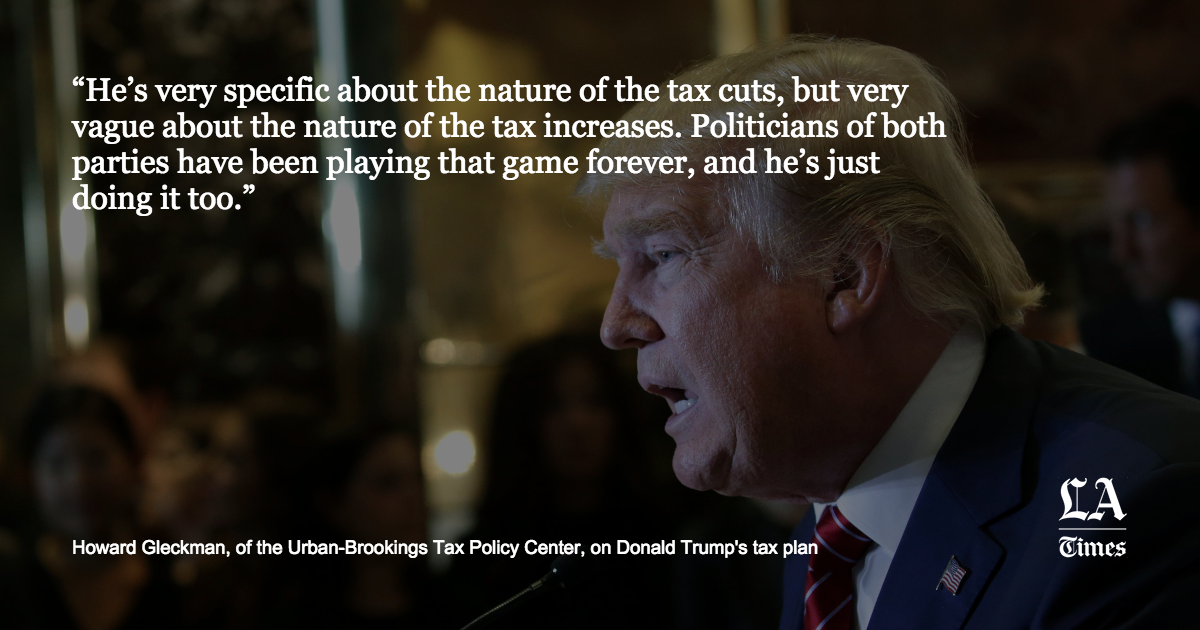O’Reilly to Trump: To win the nomination, don’t you need to be ‘a bit kinder and more mature?’
By the numbers
Welcome to Trail Guide, your daily host through the wilds of the 2016 presidential campaign. It's Tuesday, Sept. 29, and this is what we're watching:
- Former President Clinton is ready to start campaigning more for his wife
- Hillary Rodham Clinton tells actress Lena Dunham she was "terrified" that getting married would compromise her identity
- Jeb Bush outlines his energy plan in Pennsylvania
- Clinton's numbers are stabilizing among Democrats
- Have $15,000 to spare? Donald Trump's campaign bus is for sale
- Trump outlines his tax policy and experts say it would cost the U.S. untold trillions of dollars
- Planned Parenthood, the target of Republicans' ire, proves to be more popular than the GOP
- John Kasich hits the campaign trail in Chicago
Bill O'Reilly asks Trump if it's fair to say he needs to be 'more mature'
Just one week after Republican front-runner Donald Trump said he planned on boycotting Fox News, he found himself on one of the network's flagship shows Tuesday night.
On "The O'Reilly Factor," host Bill O'Reilly appeared to make nice with Trump by criticizing a common enemy -- traditional media -- but challenged him on a range of issues.
O'Reilly told Trump that the media hasn't given him a "fair shake" but asked what changes he would need to make to win the Republican nomination--and suggested one.
"Am I fair to say that in order for you to win the Republican nomination, you're going to have to change your style and be a bit kinder and more mature?" O'Reilly asked.
Trump said the question was fair, but took issue with the term "mature."
"It's not going to be a question of nice," Trump said.
Trump tweeted his intention to boycott Fox programs last Wednesday after a scheduled appearance on "The O'Reilly Factor" was canceled by the cable network:
The real estate mogul was upset again when National Review editor Rich Lowry used a crude term on air to say Trump had been castrated by Republican rival Carly Fiorina:
Fox News has not said why it originally canceled the scheduled Trump appearance, but it seemed to convey to Trump that Fox will not tolerate his public criticism of star anchor Megyn Kelly, who has been a target of Trump since she challenged him on his treatment of women during the first GOP debate in August.
Trump also tweeted criticism of O'Reilly's program for having guests and analysts who gave unfavorable assessments of his campaign.
Later in the interview Tuesday, O'Reilly asked Trump whether it was right to call GOP contender Marco Rubio a "clown." The insult "was not presidential," O'Reilly said.
Trump's excuse? Rubio started it.
"I was getting along with him perfectly well, and then all of a sudden he attacks me about nothing," Trump said. "I fought back."
O'Reilly told Trump it was acceptable to attack Rubio's immigration policy, but "it's the clown stuff that's not fine."
"Well, OK, I can understand that," Trump replied.
Winter is coming and so are the caucuses
Kasich hits Chicago to raise money, sell himself to GOP voters
Ohio Gov. John Kasich came to Chicago on Tuesday to raise campaign money and introduce himself to potential supporters in trying to navigate through the crowded Republican presidential field.
The Pittsburgh native also tried to appeal to the Wrigley Field crowd by criticizing the format of a one-game National League wild card play-in game likely to feature his Pirates and the Chicago Cubs.
"How ridiculous is it that these two teams, in all likelihood, Pittsburgh and Chicago, will play one lousy game? It's time to change this. This is an outrage," he said.
As president, "I don't know if I can order anything of Major League Baseball, but I sure would be outspoken about the fact that after 162 games you have two or three of the best teams in baseball, and they're going to play one game?" he said, noting that the National League Central Division's St. Louis Cardinals, Pirates and Cubs have records that are among the best four in baseball.
"I mean, that's the most ridiculous thing I've ever heard. Why don't we shorten the football season and expand the baseball and let them play 2 out of 3 at least?" he asked.
Unveiling his energy plan, Jeb Bush says he won't cater to 'the political hacks and the academics'
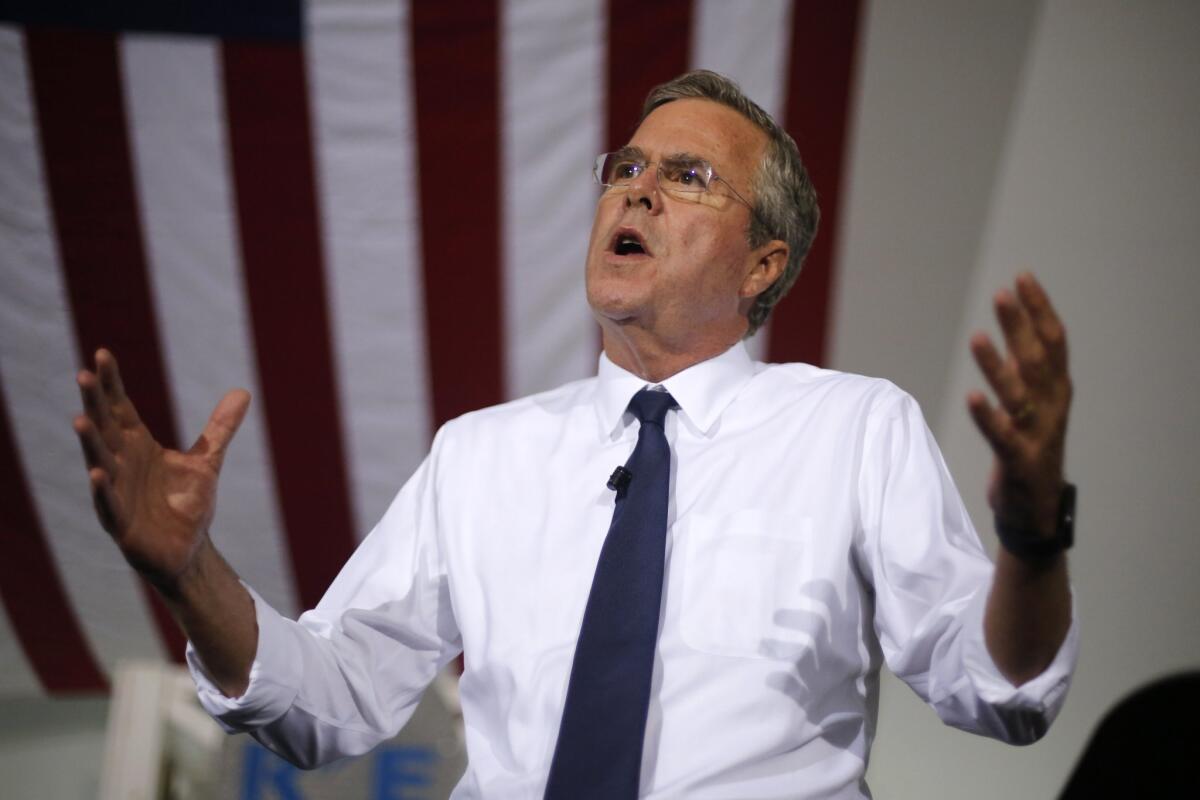
Republican presidential candidate, former Florida Gov. Jeb Bush outlines his energy policy during a visit to Rice Energy, an oil and gas company based in Canonsburg, Pa.
Jeb Bush outlined his energy plan in Pennsylvania on Tuesday, calling for lifting the ban on exporting American crude oil and removing restrictions on exporting natural gas -- changes that he said would help achieve 4% economic growth.
Bush, the one-time GOP presidential front-runner, also called for approving the Keystone XL pipeline, reducing government regulations on the oil industry -- including hydraulic fracturing -- and giving states and Native American tribes greater flexibility to pursue energy initiatives.
"States should have greater deference," Bush said at Rice Energy, a natural gas and oil company in Canonsburg, Pa.
The former Florida governor said that if he were elected president, "the political hacks and the academics are going to take the backseat" instead of "imposing their will from Washington."
"I apologize, but I think that is the best solution," he said.
Those changes, Bush argued, will "fully unleash the energy revolution" underway in the U.S., one he said has been stifled by the Obama administration. And if his plan is realized, Bush argued, it would quickly lead to consistent growth in the economy.
Referring to the Keystone XL pipeline, Bush said he would not be pressured by the "radical environmentalists" who "are not allowing Hillary Clinton and Barack Obama to do what they know is the right thing to do."
Approving the pipeline, he said, would increase gross domestic product by more than $3 billion and support 42,000 jobs while it is under construction. Once built, he said, it will be a way to move both Canadian and U.S. resources safely and quickly.
"We can balance economic interests and environmental progress," he said. "I reject the notion that we are in decline as a nation."
Freudian slip?
Bill Clinton ready for campaign duty
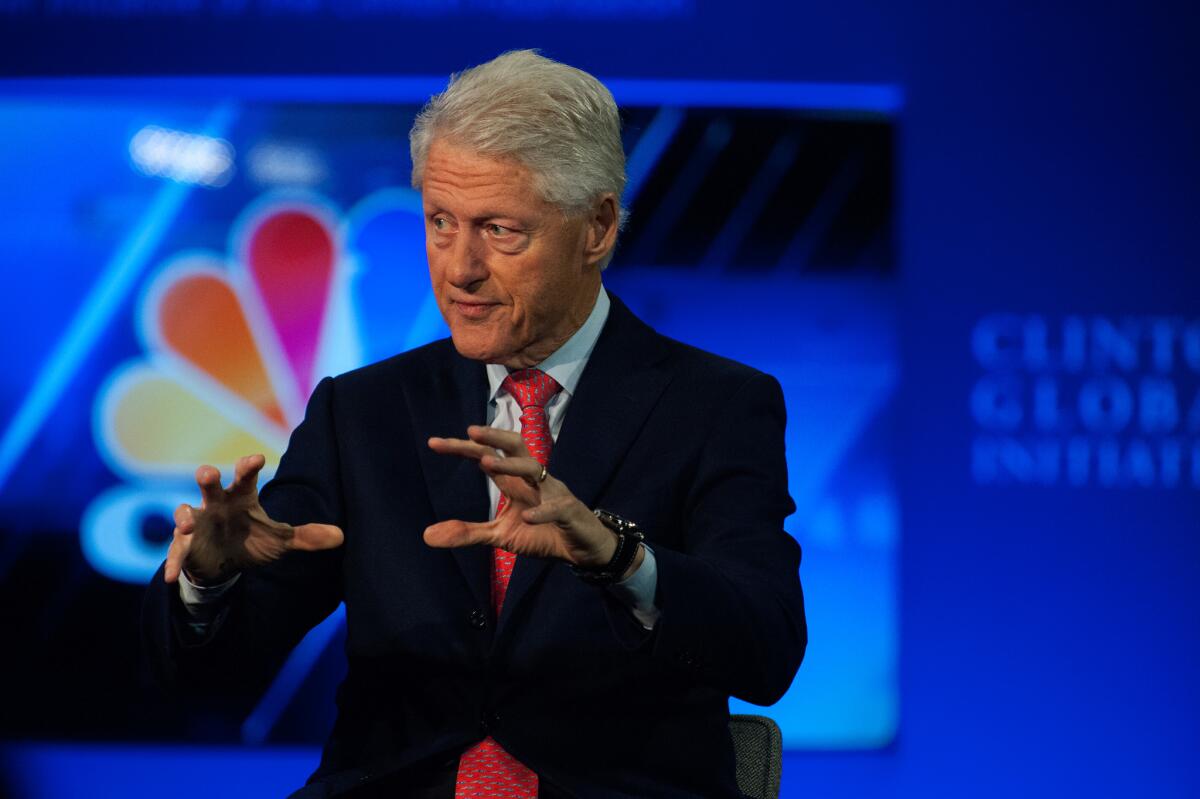
NEW YORK, NY - SEPTEMBER 28: Former U.S. President Bill Clinton speaks with CNBC’s Becky Quick during the Clinton Global Initiative Annual Meeting at the Sheraton Hotel and Towers on September 28, 2015 in New York City. The Clinton Global Initiative, happening simultaneously with the United Nation’s General Assembly, invites leaders from politics, business, and culture to discuss world issues. (Photo by Bryan Thomas/Getty Images) ** OUTS - ELSENT, FPG, CM - OUTS * NM, PH, VA if sourced by CT, LA or MoD **
As he stumped on behalf of Democrats late in the 2014 midterms, former President Clinton would jokingly compare himself to a retired racehorse as he explained why he was still out on the campaign trail.
"They slap me on the rear to see if I can get around that track just one more time," he said at one event in Kentucky.
Well, it's almost time to let Clinton out of the barn again.
After being a mostly silent player in his wife's second presidential campaign, Clinton says he's about to pick up the pace.
In an interview with CNN's Erin Burnett on Tuesday, Clinton explained that his relative lack of campaigning lately was a result of both his busy schedule with the Clinton Foundation, and a number of 20th anniversary events he'd committed to that marked major milestones in his administration.
"When this is behind us, I'll be able to do some more," he said in the interview, conducted during his annual Clinton Global Initiative event in New York.
Clinton said he expects he'll spend his time fundraising and rallying his wife's core supporters, freeing "her up to campaign more."
"She said in the beginning, 'You got to take care of the foundation first. It's your life,'" Clinton said. "We sat down and mapped out the year and said, 'Well, let's wait [till] CGI is over and I'll do the best I can.'"
Clinton will headline fundraisers for his wife this week in Atlanta and the Kansas City area, and in suburban Detroit later this month, the Associated Press reported. Campaign officials and Clinton's office declined to say what else might be in store. But in 2008, Clinton steadily ramped up his campaigning as the primaries and caucuses neared. After his wife lost the Iowa caucuses, his schedule became as active as the candidates' -- sometimes even more so.
For now, Clinton is mostly playing pundit in the interviews he's conducted around CGI, his foundation's biggest annual event.
In an interview with CNBC on Monday, he staunchly defended his wife amid a congressional investigation of the attack in Benghazi, Libya, that has largely centered on her email practices while secretary of State. He said Republicans had successfully kicked up a cloud of political dust around her that has damaged her standing in the polls, even as he insisted she had done nothing wrong.
"She's the first secretary of State in history to ask that her emails or ordinary business work be made public," he said. "I trust the American people. They'll get this. They'll work through it. They'll understand that they're being sent a heavy signal -- we don't want to run against this woman."
Hillary Clinton wants to share the 2 or 3 things left that you might not know about her
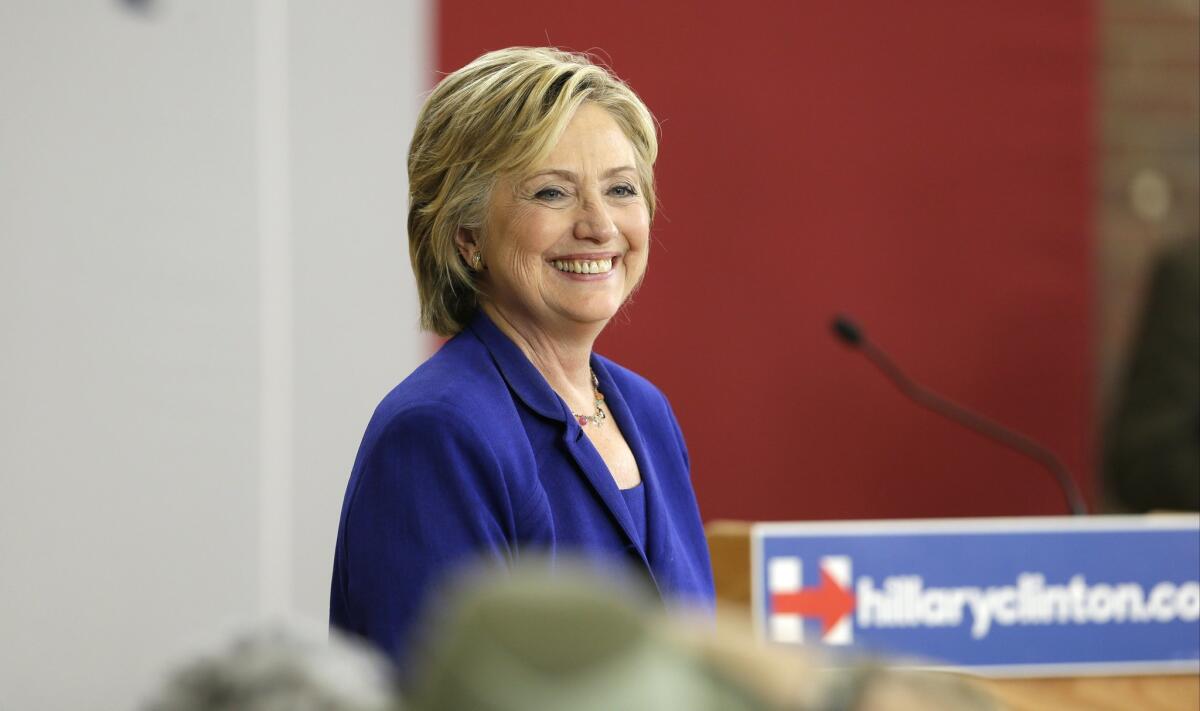
Democratic presidential candidate Hillary Rodham Clinton speaks during a community forum on healthcare, Tuesday, Sept. 22, 2015, at Moulton Elementary School in Des Moines, Iowa. (AP Photo/Charlie Neibergall)
One of the organizing principles for the 2016 version of Hillary Rodham Clinton for President was the view of her campaign team, backed by its own public polling, that the electorate still doesn't know much about arguably the world's most famous woman. That is, who she was before she was a first lady, a senator and secretary of State.
In a new interview with actress Lena Dunham, Clinton herself discusses her own anxieties at a key point in her life -- just after law school as she was dating Bill Clinton and plotting her own next steps.
"I was terrified about losing my identity and getting lost in the wake of Bill's force-of-nature personality," Clinton says in the interview for Lenny, Dunham's new email newsletter. "I actually turned him down twice when he asked me to marry him."
The decision ultimately to say yes was a gamble, Clinton said, but one she thought was worth the risk.
"I wasn't quite sure how everything I cared about might fit into a marriage with him. So, eventually, I said yes," she said. "It was a big leap of faith, and I think most marriages are. You really do just sort of say, 'OK, I think I know what it's gonna be like, but I don't know for sure. Let's find out.'"
The decision Clinton made at the time was a commitment of sorts to a life largely in support of her husband's political ambitions, rather than her own. She ultimately had a chance to pursue causes close to her because of his success, something that did lead to her own career in elected office. But her public persona is very much shaped by what happened after she married Bill Clinton, at the expense, her campaign has argued, of giving voters a sense of her earlier life experience that has guided her policy views.
The interview is just the latest example of the Clinton campaign's efforts to rectify that. Through a series of old, "Instagram-worthy" photographs in the newsletter, along with the interview, Clinton talks about some of her most formative years, as a student at Wellesley.
"We had lots and lots of vigorous debates back in those days: civil rights, women's rights, the Vietnam War, the assassinations of Dr. King and Bobby Kennedy," Clinton recalls in response to one photo.
Another shows her at a demonstration against curfews and visiting hours by men -- what she called a "personal interest."
"We had to go political to get them changed, and we did get them changed," she said. "Turning the personal into the political is sometimes the only way to stay true to the personal."
Gallup: Clinton favorable rating recovers among Democrats
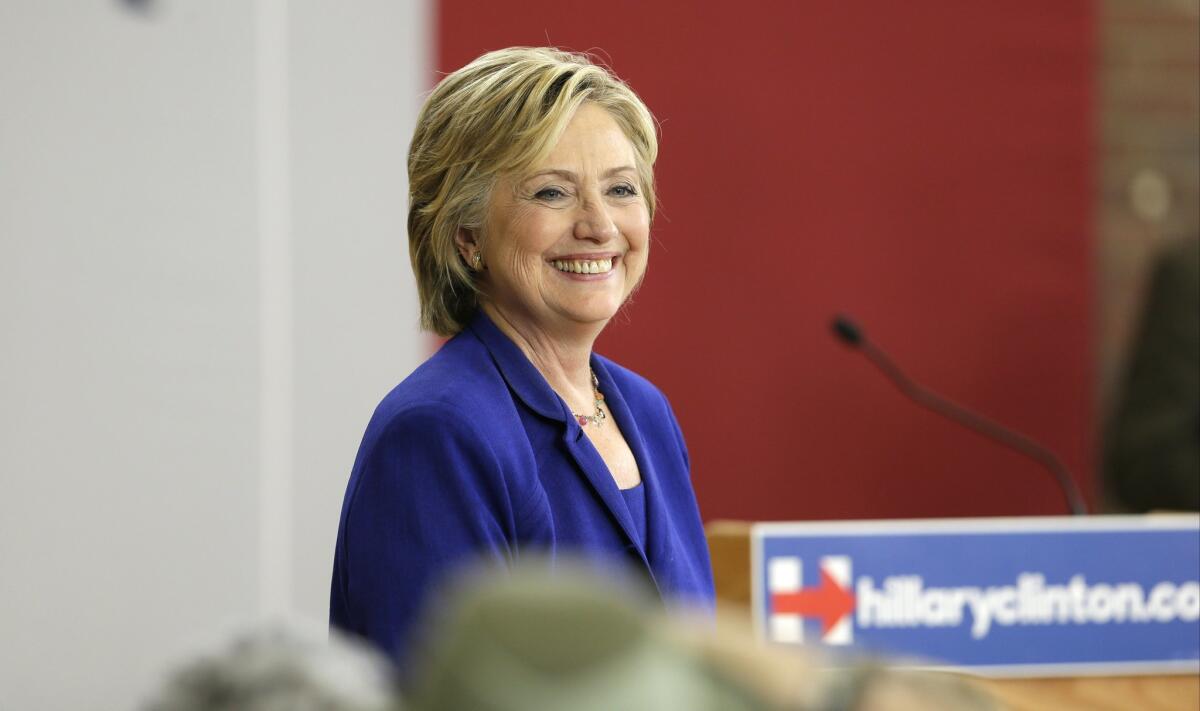
Democratic presidential candidate Hillary Rodham Clinton speaks during a community forum on healthcare, Tuesday, Sept. 22, 2015, at Moulton Elementary School in Des Moines, Iowa. (AP Photo/Charlie Neibergall)
Hillary Rodham Clinton's problems get a lot of attention, so the latest finding from Gallup may come as a bit of surprise: Her image among Democrats has been on the upswing.
Gallup runs a lot of polls, so they're able to track Clinton's image with the public. The firm reports the results as a two-week rolling average to smooth out the volatility of daily polling. The latest average shows that 73% of Democrats have a favorable image of Clinton and 20% have a negative one, for a net positive score of 53%.
That brings Clinton's net favorability among her partisans back to where it was in late August, erasing a decline that had unnerved some party activists and amplified speculation about whether Vice President Joe Biden would jump into the race.
How does that finding of an improved image for Clinton jibe with other polls that show her public image at a career low? The key point is to distinguish between polls of Democrats and polls of voters as a whole. Much of the widely discussed decline in Clinton's image among the general public has involved Republicans souring on her as she went from the relatively nonpartisan office of secretary of State to the extremely partisan job of running for president.
By contrast, Democrats have generally remained pretty positive about Clinton. That matters most right now because, after all, Clinton is running in a Democratic primary. The erosion of her image among Democrats in late August and much of September was an ominous trend , which now seems to have reversed.
If Clinton becomes the party's nominee, the opinions that Republicans and independents have of her will matter -- but only up to a point. Swing voters have become ever more rare in presidential politics, and Democratic strategists aren't counting on large numbers of them for the general election. Motivating Democrats to turn out and vote will be more central to the party's prospects, party strategists feel.
Jeb Bush to tout energy plan as fuel for economic growth
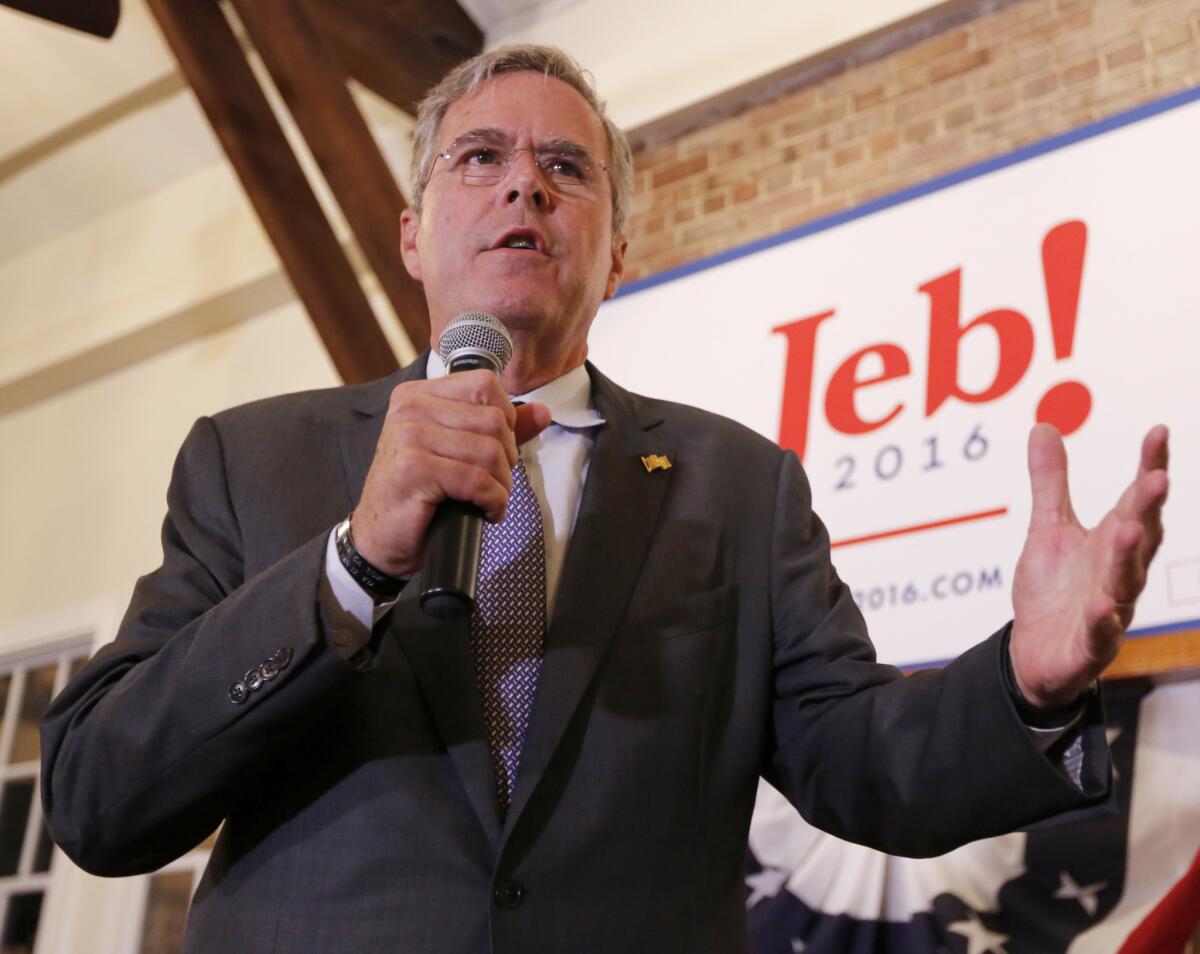
Republican presidential candidate former Florida Gov. Jeb Bush speaks to local South Carolina republicans during the East Cooper Republican Women’s Club Annual Shrimp Dinner at Alhambra Hall in Mt. Pleasant, S.C., Thursday, Sept. 24, 2015. (AP Photo/Mic Smith)
Low energy? Jeb Bush is shaking off that label to go all-in on energy.
Bush, the former Florida governor and onetime GOP presidential front-runner, is outlining a new energy strategy that his campaign argues is more than that -- a blueprint to help achieve consistent, robust growth in the U.S. economy overall.
"Energy is not just a sector of our economy. It is also an input into every other economic sector," Bush, who's been dismissed by rival Donald Trump as "low-energy," wrote in a Medium post outlining his plans. He's also expected to discuss them Tuesday at a campaign stop near Pittsburgh. "More domestic energy leads to more jobs, higher wages, lower gas prices, and smaller electricity bills, Bush said"
There are few major surprises in the details of Bush's plan. He calls for lifting the ban on exporting crude oil and liberalizing natural gas exports, approving the Keystone XL pipeline, reducing government regulations on the oil industry -- including hydraulic fracturing -- and giving states and Native American tribes greater flexibility to pursue energy initiatives on their own.
Taking those steps, Bush argued, will "fully unleash the energy revolution" underway in America, one he saids has been stifled by the Obama administration. And if his plan is realized, Bush said, it would quickly lead to consistent growth in the American economy, at a annual rate of 4% in the gross domestic product.
The most recent estimate of the U.S. economy showed the GDP grew at 3.9% in the second quarter, an acceleration of the economy after just a 0.6% rate of increase in the first quarter.
For sale: Donald Trump's campaign bus
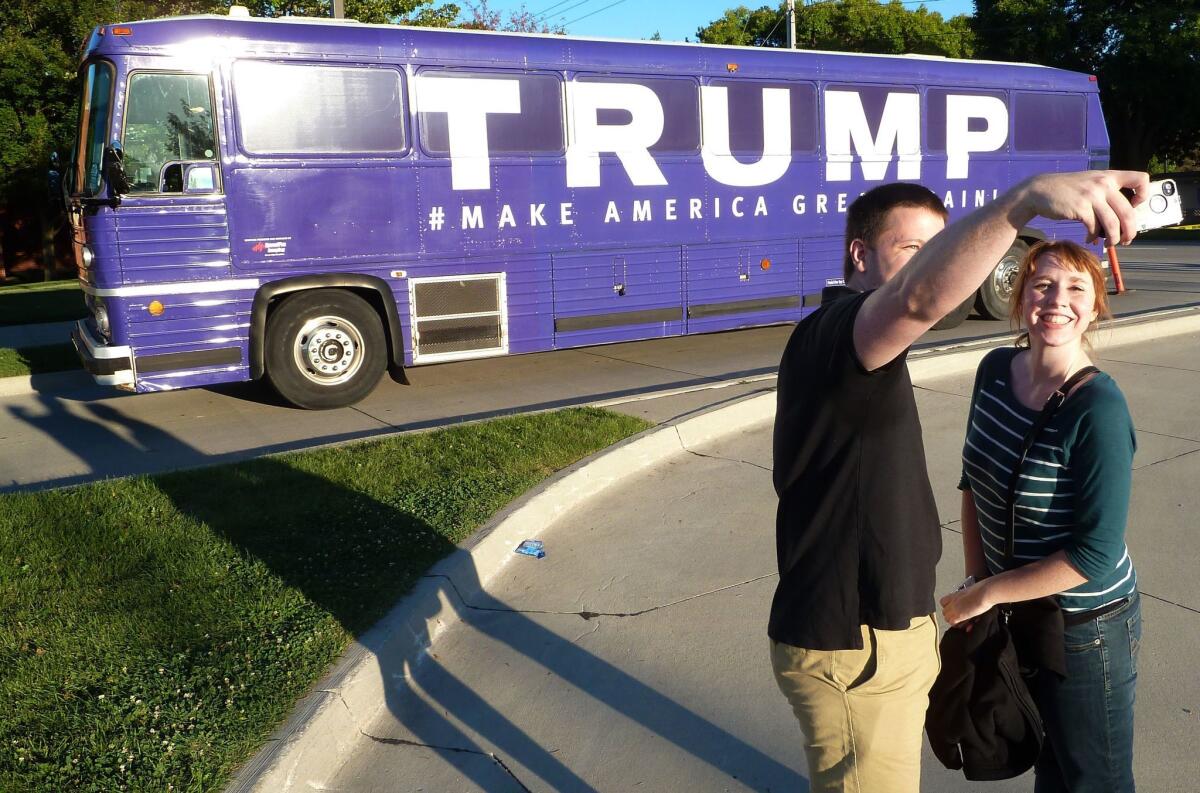
If you've ever wanted to drive something with Donald Trump's name plastered on it, you're in luck. The Republican presidential front-runner's Iowa campaign bus is for sale, and it will cost you only $15,000.
The 40-foot bus emblazoned with the slogan "Make America Great Again" was first posted for sale on the classified advertising website Craigslist on Monday, the Des Moines Register reports, but it was deleted within a few hours.
Still, the bus' owner and mechanic insist it is for sale.
"I know they took it off of Craigslist because it was ruffling some feathers -- frankly, I don't care -- but it's my partner's bus and he wants to sell it, so we're going to sell it," Mark Gearhart, the bus' mechanic, told the paper.
Gearhart wouldn't elaborate on who was offended by the ad.
The royal blue coach -- a former Greyhound bus -- has more than 1 million miles on it, owner Steve Drake said. It's stocked with undercarriage storage, a bathroom, air conditioning and a TV, among other amenities.
"I figured if I could sell it while it's hot, while Donald's hot, I would try to do that," Drake told the Register. "If not, I'll just keep it and use it."
By the numbers
Sign up for Essential California
The most important California stories and recommendations in your inbox every morning.
You may occasionally receive promotional content from the Los Angeles Times.
